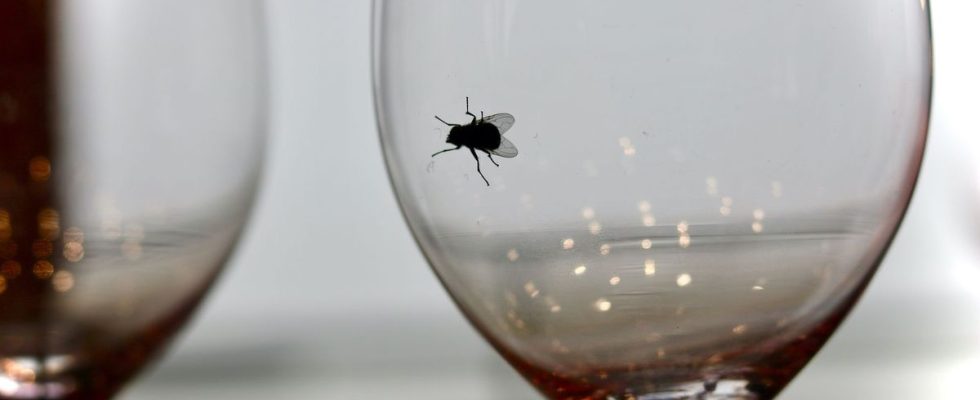Published on
Updated
Reading 2 min.
Did a fly get into your glass of wine at aperitif time? Should you throw it away or continue your tasting (minus the fly, of course)? Science has a precise answer to this delicate situation.
Drink or… Throw away? The question may arise when a fly dares to enter your glass of freshly served wine. But after the fleeting feeling of disgust, is your glass contaminated, and is it still dangerous to drink it? The question was asked in the media The Conversationand the answer might surprise you.
Fruit flies, a concentrate of bacteria
It must be said, common flies, or fruit flies, are unsavory species and for good reason: these fruit flies live in our trash cans, our sewers, and feed on rotting food. The rotten food they eat is rich in germs and bacteria: E coli, Listeria, Shigella and Salmonella, well known for causing infections and food poisoning. To think for a second that these little creatures could have deposited some of these bacteria in your glass (which is the case!) would therefore invite you to throw away the contents. And yet, it’s not really necessary.
Wine, a little-known antibacterial weapon
According to science, drinking a glass of wine that has a fly in it for a few seconds poses no risk, as strange as it may seem. An observation which can be explained by several facts:
- Wine typically contains between 8 and 14 percent ethanol and has a pH of around 4 or 5 – a pH below 7 is considered acidic, a formula that inhibits germs (which is why wine can be stored years !). The combined effects of wine alcohol and organic acids, such as malic acid, can therefore prevent the growth of E coli and Salmonella;
- If the wine the fruit fly got into is also refrigerated, this would shock the metabolism of some food poisoning bacteria and prevent them from growing;
- All types of wine (red, white or rosé), whether fresh or at room temperature, are also naturally antibacterial: the germs found there are likely to be damaged, which will reduce their capacity for infection. So even germs deposited in the wine by flies present in a high dose will be too damaged to harm you.
Your body can also defend itself
Here again, the bacteria spread by flies will have a lot to do if they pass the barrier of your mouth. Arriving in the stomach, these will encounter the highly acidic fluids of the human stomach to which they are very sensitive. Stomach acid alone can kill them, and other barriers are also put in place, such as digestive enzymes, or the immune system. Quite a turnover which makes intoxication unlikely, if not impossible.
Yes, you can drink your drink
If we stick to science, then, yes, you can eject the intruder and continue your tasting, especially if it is a grand cru. The media even admits that if you swallow the fly at the same time, “it will be processed by your body like any protein.”. There remains the barrier of disgust which is no longer a matter of science, but of perception.
